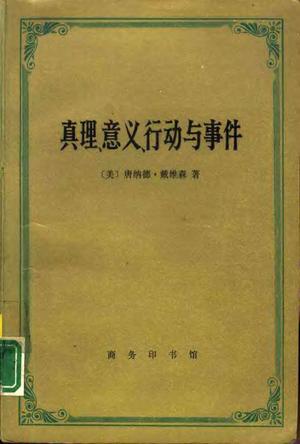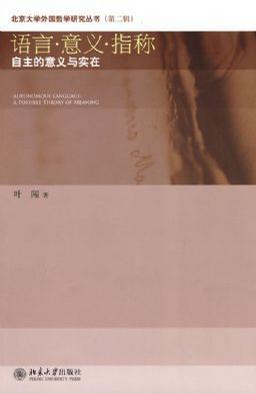-

真理、意义、行动与事件
-

语言·意义·指称
这是一本有原创性的著作。意义与指称问题是分析哲学乃至整个哲学的一个具有根本重要性的问题,它是哲学领域中其他问题和讨论的概念基础。长期以来,在意义理论中占统治地位的观念,都把指称解释为语言与世界中对象的关系,并据此而把意义与世界联系起来。传统观念在理论上造成一系列困难,不能解决虚构对象的名字等诸多语言现象。本书针对过去流行理论的困难,而提出一种解决方案,它力图重新解释指称概念,并由此而解释意义对指称的直接决定作用。在此方案之下,意义与世界的关系不再是一种直接的概念关系,而是一种发生学的关系。这个分析的结果同时修改了弗雷格关于意义决定指称的理论,从而确定了意义所具有的自主的性质。本书从对当代语言哲学的主流观念的分析入手,提出了对于指称问题,指称与意义的关系问题,分析性概念的性质问题,意义本身的性质问题等一系列基本的主张,这些主张建立在语言相对于世界的自主性质的基础之上。对于意义与指称概念的不同于传统的解释,引出对真理,对语言的历史发生,对语言的社会性等的重新理解。它的直接结果将使哲学中困扰人们多年的否定存在问题等等,有了不同于传统的解释的可能。 -

意义的形而上学
《意义的形而上学》内容简介:对于20世纪的西方世界而言,哲学的焦点是语言。而对于语言的深层结构和规则而言,其焦点是自然主义。卡茨指出,由于维特根斯坦、奎因、戴维森、乔姆斯基等人关于意义与语言的特定论证,将20世纪的英美哲学引入了自然主义,并使其成为这个时代占主导地位的哲学。而《意义的形而上学》的目的,正是对于这种自然主义的语言及哲学观念进行批判,从而为另一种求真之路提供可能。 在《意义的形而上学》中,卡茨的批判分为两个部分。一、对当代自然主义的两位设计师(维特根斯坦与奎因)的论证进行系统的、全面的分析,并表明他们的论点不足以支持自然主义。二、识别出自然主义的根本问题,即其哲学立场与手段之间悖论性的关系。 -

Philosophy of Language
Philosophy of Language: a Contemporary Introduction introduces the student to the main issues and theories in twentieth-century philosophy of language, focusing specifically on linguistic phenomena. Topics are structured in three parts in the book. Part I, Reference and Referring Expressions, includes topics such as Russell's Theory of Desciptions, Donnellan's distinction, problems of anaphora, the description theory of proper names, Searle's cluster theory, and the causal-historical theory. Part II, Theories of Meaning, surveys the competing theories of linguistic meaning and compares their various advantages and liabilities. Part III, Pragmatics and Speech Acts, introduces the basic concepts of linguistic pragmatics, includes a detailed discussion of the problem of indirect force and surveys approaches to metaphor. Part IV, new to this edition, examines the four theories of metaphor. Features of Philosophy of Language include: New chapters on Frege and puzzles, inferentialism, illocutionary theories of meaning and relevance theory chapter overviews and summaries clear supportive examples study questions annotated further reading glossary -

Naming and Necessity
If there is such a thing as essential reading in metaphysics or in philosophy of language, this is it. Ever since the publication of its original version, Naming and Necessity has had great and increasing influence. It redirected philosophical attention to neglected questions of natural and metaphysical necessity and to the connections between these and theories of reference, in particular of naming, and of identity. From a critique of the dominant tendency to assimilate names to descriptions and more generally to treat their reference as a function of their Fregean sense, surprisingly deep and widespread consequences may be drawn. The largely discredited distinction between accidental and essential properties, both of individual things (including people) and of kinds of things, is revived. So is a consequent view of science as what seeks out the essences of natural kinds. Traditional objections to such views are dealt with by sharpening distinctions between epistemic and metaphysical necessity; in particular by the startling admission of necessary a posteriori truths. From these, in particular from identity statements using rigid designators whether of things or of kinds, further remarkable consequences are drawn for the natures of things, of people, and of kinds; strong objections follow, for example to identity versions of materialism as a theory of the mind. This seminal work, to which today's thriving essentialist metaphysics largely owes its impetus, is here published with a substantial new Preface by the author. -

走进分析哲学
分析哲学是20世纪最主要的哲学思潮,它使逻辑分析成为哲学的基本方法,使语言成为哲学研究的直接对象,从而使哲学研究发生了根本性的变化,促成了“语言转向”,在哲学领域中形成了一场所谓“哥白尼式的革命”,对哲学的发展产生了重大而深远的影响。它的代表人物弗雷格、罗素、维特根斯坦、卡尔纳普等人的思想至今影响不衰。 《走进分析哲学》通过分析亚里士多德、中世纪学者和海德格尔的相关论述指出,语言分析自古有之,但是,单纯的语言分析,并不会成为分析哲学。因此,《走进分析哲学》不仅展现了分析哲学的思想和面貌。而且把它放在哲学史的主线上,揭示了它的独特性质和意义。